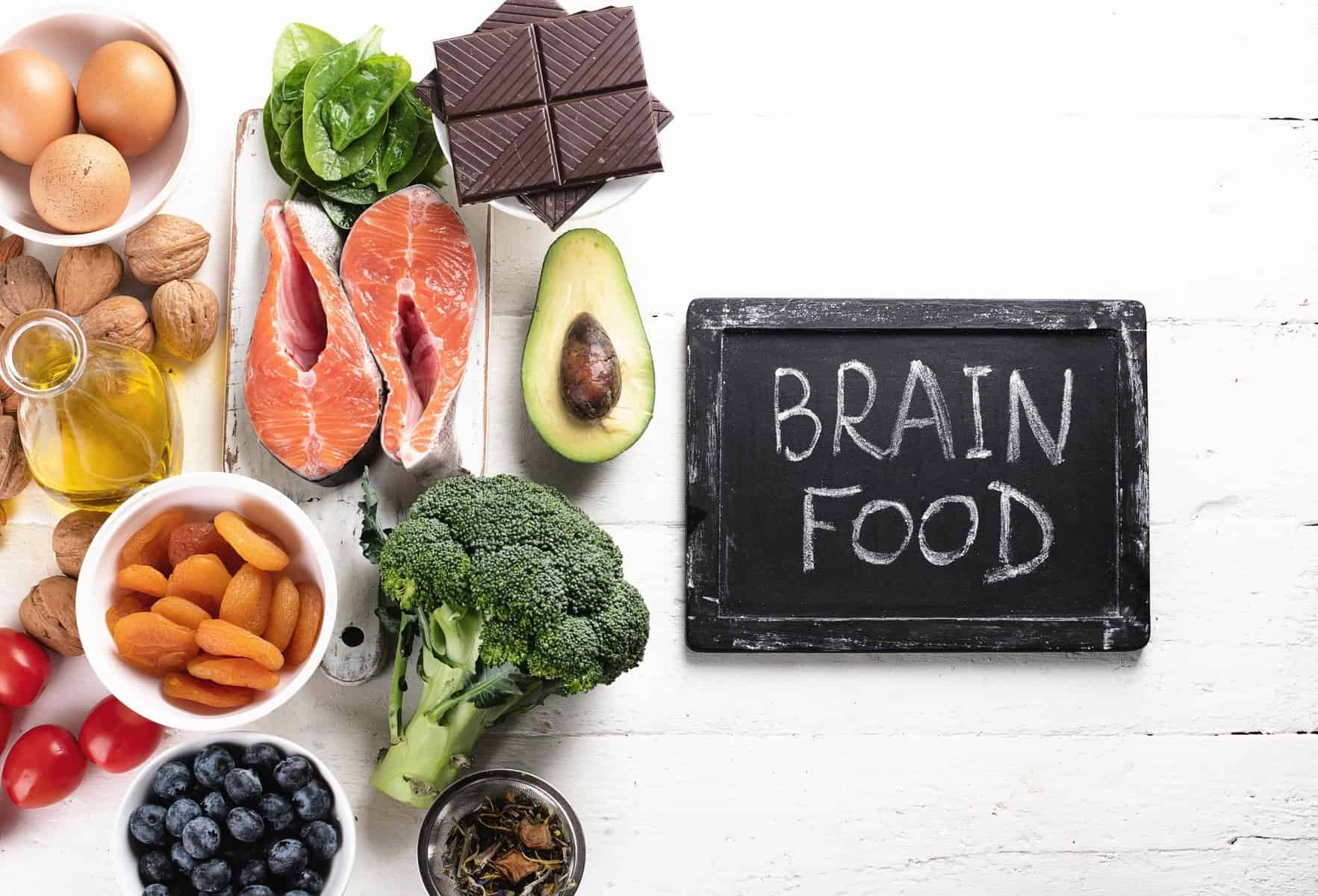 How often does it get to the middle of the afternoon, and your brain feels like it switches off? Do you ever get feelings of ‘brain fog’ or find your mind wandering away from the task at hand? Do you ever find that after eating certain meals, you feel a certain way? Funnily enough, what you eat plays a role in how well your brain is functioning at present and in the future.
How often does it get to the middle of the afternoon, and your brain feels like it switches off? Do you ever get feelings of ‘brain fog’ or find your mind wandering away from the task at hand? Do you ever find that after eating certain meals, you feel a certain way? Funnily enough, what you eat plays a role in how well your brain is functioning at present and in the future.
If you think about it, your brain is always ‘on’. Without even being aware of it, our brains are taking care of every thought we have, every movement we make, ensuring our heart keeps beating, and we continue to breathe in and out. Our brains work hard – even when we sleep!
All this work means that our brains require a constant supply of fuel. That fuel comes from the food we eat, and research now suggests that what you eat makes a difference. Just like your car, our brains have been found to react better, and deteriorate slower, when provided better fuel.
Keeping Your Brain Fuelled
Carbohydrates are the preferred fuel source for the brain. Carbohydrates are made up of fibre, starch, and sugars. However, the brain is unable to use these carbohydrates for energy until they are broken down into glucose – which can take some time! As such, by maintaining a good amount of carbohydrates and therefore sugar in our body, we can manage our energy, mood, and hunger.
However, not all carbohydrates are created equally. Some carbohydrates are easily digested and turned into glucose, causing our sugar levels to rise and fall more quickly. This results in crashes in energy. We consider these carbohydrates to be refined, and they are found in foods that are more highly processed such as white bread, chocolate, chips, soft drink, and other ultra-processed foods.
On the other hand, we have complex carbohydrates. This type takes longer to digest and as such slowly releases glucose into the blood stream, providing sustained energy (and stable mood, reduced cravings, and improved focus). Complex carbohydrates are found in foods that have not undergone major processing such as fresh fruit, wholegrain cereals, legumes, and starchy vegetables.
It isn’t all bad news. While it is preferrable to consume complex carbohydrates where possible to ensure we are providing our brains with sustained energy, we can still enjoy our favourite carbohydrate treats! By combining our carbohydrate of choice with protein and/or fats we can slow the speed of which carbohydrates are digested and turned into glucose. For example, instead of enjoying a plain cracker for afternoon tea which would give you a quick burst of energy and then have you sitting in a slump not too long after, try adding a topping or two like ricotta cheese or flavoured tuna, for a more sustained release that will give you enough energy to get through until dinner.
Keeping your Brain Healthy
The science is still emerging when it comes to single nutrients that may improve brain health. The difficulty with the research being that nobody consumes a diet consisting of a single nutrient (could you imagine?). However, several nutrients have been identified for their potential benefits to the brain.
Omega-3s
Omega-3s are vital for normal brain function; they have roles in preserving cell membrane, facilitating communication between brain cells and have even been found to be protective against depression. Low Omega-3s have been found to cause learning and memory deficits and accelerate brain aging. Omega-3s are not manufactured in the body, but instead consumed through a diet containing oily fish, nuts, avocados, flax seeds, and supplementation. It should be noted that increasing consumption was not found to benefit an already healthy brain.
Vitamin E & C
These vitamins have antioxidant properties that have been shown to reduce the damage done to the brain structures and aid in repair. Fruits and vegetables provide a wonderful source of vitamin C (including capsicum, asparagus, avocado and pumpkin), while nuts and seeds are a great source of vitamin E.
Polyphenols
Polyphenols are plant-based compounds that also play an antioxidant role in the body. Antioxidants are known for their ability to combat cell damage. Each different naturally coloured food we consume contains polyphenols (with similar colours containing similar combinations) and as such it is important to consume a rainbow.
These nutrients are commonly observed in three diets that have been highlighted as the best for maintaining and improving brain health. These diets include the Mediterranean, DASH, and MIND diet. While all slightly different, each of the diets contain similar dietary principles:
- Load up on vegetables
- Enjoy a rainbow of fruit
- Snack on nuts
- Cook with olive oil
- Enjoy meat free meals
- Consume fish weekly
Eating For Your Brain
Unfortunately, currently there is not one quick fix to improve your brain health. However, by adopting some of the mentioned techniques above you will be well on your way to improving your brain function and helping it age healthily.
To see how it might look in practice, try some of the recipes below found on The Healthy Eating Hub.
Meals
- Lemon Ricotta Chicken Pasta Salad
- Quick Tuna, Rice and Coleslaw
- Sweet Chilli and Coconut Tofu Stir Fry
- Toasted Pizza Sandwich
Snacks
- Avocado and Vegemite Cruskits
- Yoghurt and Berries
- Sliced Apple with Peanut Butter
- Hummus, Ham & Tomato Crackers
If you want help improving your mood, energy, or focus, using food our dietitians are here to help!
References
Morris, M. C., Tangney, C. C., Wang, Y., Sacks, F. M., Barnes, L. L., Bennett, D. A., & Aggarwal, N. T. (2015). MIND diet slows cognitive decline with aging. Alzheimer’s & Dementia, 11(9), 1015–1022. https://doi.org/10.1016/j.jalz.2015.04.011
Morris, M. C., Tangney, C. C., Wang, Y., Sacks, F. M., Bennett, D. A., & Aggarwal, N. T. (2015). MIND diet associated with reduced incidence of Alzheimer’s disease. Alzheimer’s & Dementia, 11(9), 1007–1014. https://doi.org/10.1016/j.jalz.2014.11.009
Stevenson, E. J., Shannon, O. M., Minihane, A. M., Adamson, A., Burns, A., Hill, T., Sniehotta, F., Muniz‐Terrera, G., & Ritchie, C. W. (2020). NuBrain: UK consortium for optimal nutrition for healthy brain ageing. Nutrition Bulletin, 45(2), 223–229. https://doi.org/10.1111/nbu.12429
Vandewoude, M., Barberger-Gateau, P., Cederholm, T., Mecocci, P., Salvà, A., Sergi, G., Topinkova, E., & Van Asselt, D. (2016). Healthy brain ageing and cognition: Nutritional factors. European Geriatric Medicine, 7(1), 77–85. https://doi.org/10.1016/j.eurger.2015.12.005
Zamroziewicz, M. K., & Barbey, A. K. (2016). Nutritional Cognitive Neuroscience: Innovations for Healthy Brain Aging. Frontiers in Neuroscience, 10. https://doi.org/10.3389/fnins.2016.00240
Zepf, F. D., Hood, S., & Guillemin, G. J. (2015). Food and your mood: nutritional psychiatry. The Lancet Psychiatry, 2(7), Article e19. https://doi.org/10.1016/s2215-0366(15)00241-2



